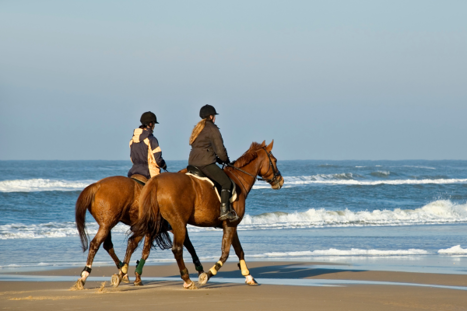
Horse riding on the beach UK: Expert tips and must-know advice
Fancy a trip to the beach with your horse? Everything you need to do and know in this blog!
Equetech | June 19 2025Whether you're a seasoned equestrian or a beginner, the UK offers some stunning beaches, making it the perfect destination for you and your horse. In this essential guide, we share our expert tips and essential advice on where to ride, what to wear and how to stay safe on Britain's golden sands to enjoy some unforgettable beach rides.
Why Beach Horse Riding in the UK Is So Special
Despite the weather, the UK has some of the world's most picturesque coastlines. From the windswept shores of Wales to the golden sands of Cornwall and the Scottish Highlands, there are some fantastic opportunities for horse riders to enjoy this thrilling experience.
The combination of miles of sandy beach, natural beauty and fresh sea air makes coastal hacking a favourite 'bucket list' amongst many UK riders and visiting tourists alike.
Top Beaches in the UK for Horse Riding
Before planning your beach ride, you must do your research. Not every beach is safe to ride on or allows horses as beach users. You need to confirm if horse riding is permitted. Finding a beach suitable for you and your horse takes some research and planning. Some of the most popular UK beaches for horse riding in the UK include:
- Holkham Beach, Norfolk
- Perranporth Beach, Cornwall
- Redcar Beach, North Yorkshire
- Ogmore-by-Sea, Wales
- Camber Sands, Kent
- Balmedie Beach, Scotland
- Hayling Island, Hampshire
If you are planning a beach ride, make sure you check the local council regulations. Look out for any seasonal restrictions which may prevent access to horse riding on a lovely sand beach.
Expert Tips for Safe Beach Horse Riding
If you're planning a beach trip, it's essential to consider safety for both you and your horse. Here are some important considerations.
1. Take Note Of The Tides
Always check the tide times before heading out. Ride during low tide when the sand is firmer and safer for horses. Rising tides can trap you against cliffs or narrow paths, so plan your route and timings accordingly. Be wary of riding too far into the sea. Even if your horse is confident, you don't know what is on the seabed or how strong the currents are, so stick to the edge of the sea.
2. Check The Beach First
Before heading off on horseback for your beach experience, you should take a look along the route you plan to ride to check that the beach footing is stable. Look for any hazards that may have washed up on the shoreline and take note of the sand dunes and beach environment to determine if it is safe to ride. You should also consider beach wildlife, dog walkers and other beach users are kept safe to ensure you can enjoy an exhilarating beach ride without any issues.
3. Make Sure Your Horse Is Fit Enough
Remember that riding on sand is physically demanding for horses. To ensure a brilliant beach ride, ensure your horse is fit and accustomed to uneven terrain. In preparation for your beach ride, build up fitness, and when you get to the beach, assess the surface. Is it firm sand or soft sand in places? Consider these variables to ensure your exhilarating experience on a breathtaking beach isn't ruined by injury or an accident.
What to Wear and Bring for a Beach Ride
Our MD and equestrian clothing designer, Liz Hayman, has these tips for ensuring you are dressed appropriately for a fantastic beach ride.
1. Appropriate Riding Gear
"I love beach rides, but safety is always paramount when it comes to your riding outfit. Make sure you wear your helmet with a chin strap, riding boots with a proper heel and grip, and riding breeches or riding tights with a silicone seat for extra stickiness in the saddle - essential when riding an excitable horse! Take some waterproof layers even if the weather forecast is looking good; things can change very quickly in coastal areas."
"I never hack out without my body protector and air jacket, so if you are anticipating a less-than-calm horse, you should follow my advice. And even if you are an experienced rider or riding an experienced horse, safety should always come first."
"I would also take a spare change of clothes and a towel," Explains Liz,
"Especially if you want to get your feet wet in the sea. Your horse might want to splash around on the tide's edge, resulting in you getting soaked. A cosy change of clothing and a warm waterproof coat are ideal."
2. Safety Essentials
"Ensure you have a mobile phone in a secure pocket or pouch. Our Ultimo Grip Breeches feature a secure pocket on the thigh, making them ideal for storing your phone while riding. I would also include an emergency first aid kit for both horse and human in your transport, and enough water for both you and your horse after the beach ride. A reflective hat silk is also useful if you find that visibility has dropped by the time you are ready to head to your lovely sand beach. Wearing high-viz also helps other beach users spot you in advance, especially when walking dogs off leads."
3. Beach Essentials For Your Horse
"Alongside good-fitting tack, you may want to consider their suitability for riding on the beach. For example, you may wish to add a martingale or a safety strap to the D-rings of your saddle. Check your tack regularly for any wear or tear. Having a stirrup leather snap or reins is not something you want to happen at your beach destination. If your horse is prone to knocking themselves, a set of breathable protective brushing boots and overreach boots are worth packing for your beach visit. Have a cooler rug and waterproof rug onboard you can pop on after riding and, of course, water and a haynet."
Beach Riding Etiquette
It's important to note that not all beaches are open to riders year-round, so double-check before planning a beach trip. It should go without saying, but always remain respectful of other beach users, including walkers, dog owners, and wildlife. It can take just a handful of complaints to put an end to horse riding on the beach, so be courteous.
1. Follow Local Rules
Some beaches require a permit or have designated horse-riding zones. Some beaches only allow you riding access during certain hours, so if you are planning to ride on a beach during summer evenings, then check with the local council or landowner before your visit.
2. Leave No Trace
Always clean up after your horse and sweep up hay and mess in the beach car park. When riding, avoid disturbing dunes or nesting areas, and stick to marked paths when entering or leaving the beach.
Frequently Asked Questions About Horse Riding on the Beach in the UK
1. Can you ride horses on any beach in the UK?
Not all UK beaches allow horse riding. Access often depends on local council regulations, time of year, and tide schedules. Always check with the local authority or beach management before planning your ride.
2. Do I need a permit to ride a horse on a UK beach?
Some beaches require a permit, especially in popular tourist areas or nature reserves. Contact the relevant council to determine if you need a permit and whether you are permitted to ride during peak season.
3. When is the best time to go horse riding on the beach?
The best time is during low tide when the sand is firmer and safer for your horse. Avoid riding during high tide or after heavy rain, as soft, wet sand can be tiring and dangerous for horses. Always assess the beach on foot before getting in the saddle.
4. Is beach riding safe for beginner riders?
Beach riding can be suitable for beginners if supervised by an experienced rider or done through a licensed riding school. Choose a calm, trained horse and a wide, quiet beach with easy access. Beginners can get a taste for riding on the beach with staff leading their horses so that everyone can enjoy the UK's beautiful beaches.
5. What should I bring for a beach horse ride?
As Liz Hayman explains, essentials include a riding helmet, proper riding boots, a body protector, high-visibility clothing, a mobile phone, water, a first aid kit, and weather-appropriate clothing. For longer rides, consider carrying a snack and a foldable hoof pick.
6. Are there horse riding schools or tours for beach rides in the UK?
Yes, several riding centres across the UK offer guided beach rides, including in Cornwall, Wales, and Northumberland. These are great options for beginners or those without their own horse.
7. Can I gallop on the beach?
Galloping is possible on wide, open beaches with firm sand, but it's essential to assess the surface and be mindful of other beach users. Only gallop if it is safe to do so, and your horse is under control, fit, calm, and responsive.
8. Where do I park a horsebox for a beach ride?
When you contact the local council, you should find out how to gain access to beaches and where you can park your horse lorry or trailer. Some beaches have designated horsebox parking with specific entry and exit times and instructions. Park considerately to ensure you do not make the beach inaccessible for any emergency vehicles.
Ready to saddle up? Choose your beach, follow our expert tips, and enjoy the ride of a lifetime.


